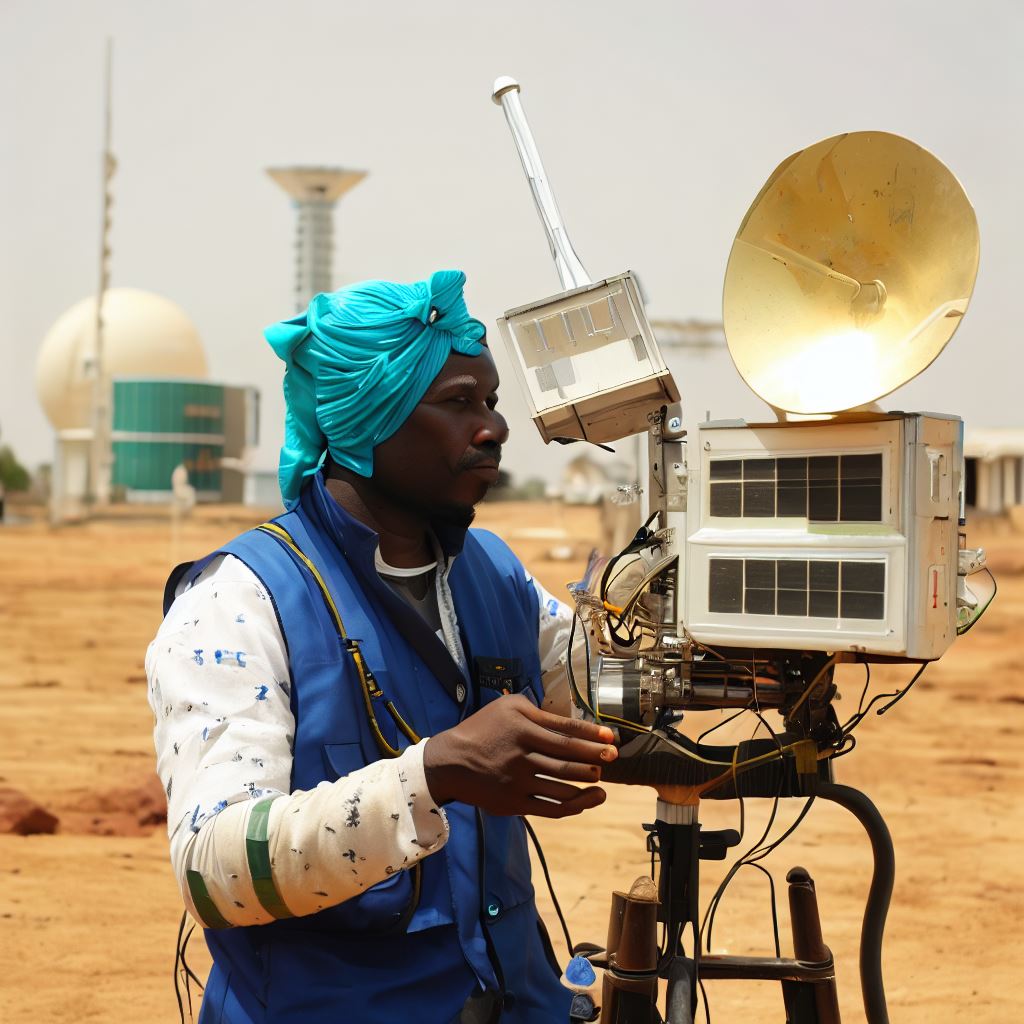Introduction
Nigeria’s journey into space is not just a matter of national pride; it’s a testament to the nation’s commitment to scientific progress.
In a world increasingly reliant on space technology, Nigeria’s participation is significant.
The scientists spearheading Nigeria’s space exploration efforts are at the forefront of groundbreaking research and innovation.
Their contributions extend beyond the boundaries of our planet.
Space exploration isn’t merely about venturing into the unknown; it’s about unlocking the potential of cutting-edge technology.
Nigerian scientists are harnessing this potential to address critical challenges.
The scientist’s role encompasses a wide range of responsibilities, from designing and launching satellites to conducting space-related research.
These endeavors contribute to advancements in various sectors.
Nigeria’s space exploration efforts have already borne fruit, with the launch of communication satellites that enhance connectivity across the nation.
This achievement exemplifies the tangible benefits of space science.
Moreover, Nigerian scientists play a pivotal role in global space research collaborations, further solidifying the nation’s presence in the international space community.
The success of Nigeria’s space endeavors hinges on the dedication and expertise of its scientists.
Their unwavering commitment drives technological advancements and scientific discoveries.
This blog section will delve deeper into the vital role of scientists in Nigeria’s space exploration.
We’ll explore their contributions, challenges, and the impact of their work on the nation’s development.
Join us on this journey to uncover the remarkable achievements and aspirations of Nigerian scientists in the field of space exploration.
Overview of Space Exploration in Nigeria
History and Development of Space Exploration in Nigeria
Nigeria’s journey in space exploration began in 2001 with the establishment of the National Space Research and Development Agency (NASRDA).
NASRDA was created by the Nigerian government to spearhead the country’s space program.
- The first major milestone was the launch of Nigeria’s first satellite, NigeriaSat-1, in 2003.
- NigeriaSat-1 was developed in collaboration with Surrey Satellite Technology Limited (SSTL) in the United Kingdom.
- Since then, Nigeria has made significant progress in space technology, including the launch of additional satellites.
- In 2007, Nigeria launched NigeriaSat-2 and NigeriaSat-X, both designed for disaster monitoring and management.
- These satellites have greatly contributed to Nigeria’s efforts in areas such as agriculture, mapping, and environmental monitoring.
- In 2011, Nigeria further demonstrated its commitment to space exploration by launching Nigeria Communication Satellite 1R (NigComSat-1R).
- NigComSat-1R is a communication satellite that enhances Nigeria’s communication capabilities and provides services across Africa.
- Overall, Nigeria’s space program has evolved from satellite development to fostering technological growth and addressing crucial national needs.
Key Accomplishments and Milestones
- One of Nigeria’s notable achievements in space exploration is the successful launch and operation of satellites.
- NigeriaSat-1, NigeriaSat-2, and NigeriaSat-X have significantly contributed to various sectors of the Nigerian economy.
- These satellites have aided in improving agricultural practices, disaster management, and resource mapping.
- Nigeria Communication Satellite 1R (NigComSat-1R) has enhanced communication services across Africa.
- Another significant milestone is the training of Nigerian scientists and engineers in space technology through collaborations and scholarships.
- These capacity-building initiatives have produced a skilled and knowledgeable workforce in the field of space exploration.
- Nigeria’s space program has also fostered international partnerships, including collaborations with other space agencies and organizations.
- These partnerships have contributed to knowledge sharing, technology transfer, and joint research and development projects.
- Nigeria’s space achievements have gained recognition and respect within the international space community.
- The country’s dedication to space exploration has positioned Nigeria as a key player in Africa’s space industry.
The Nigerian Space Agency and Objectives
- The National Space Research and Development Agency (NASRDA) is the primary space agency in Nigeria.
- NASRDA’s primary objective is to develop and deploy space technology for national development.
- It aims to harness the benefits of space science and technology for socio-economic growth in Nigeria.
- NASRDA focuses on various areas, including satellite development, space science research, and human capacity building.
- The agency collaborates with international partners to acquire advanced knowledge and technology in space exploration.
- NASRDA’s objectives also include promoting awareness and education in space science and technology.
- Through public outreach programs, NASRDA aims to inspire the next generation of Nigerian space scientists.
- Furthermore, NASRDA plays a significant role in policy formulation and advising the Nigerian government on space-related matters.
- The agency’s efforts contribute to Nigeria’s overall development and its aspiration to become a space-capable nation.
- With a clear vision and strategic objectives, NASRDA continues to drive Nigeria’s space exploration endeavors.
In fact, Nigeria has made remarkable progress in space exploration since the establishment of the National Space Research and Development Agency.
Nigeria’s satellite development, capacity building, and international collaborations establish it as a key player in Africa’s space industry.
The Nigerian Space Agency drives space tech benefits for national development and inspires future space scientists.
Read: Education for Space Scientists in Nigeria: A Pathway

The Scientist’s Role in Space Exploration
Specific Contributions and Responsibilities of Scientists in the Field
- Scientists play a crucial role in space exploration by conducting research and experiments.
- They contribute to the development of new technologies and innovations for space missions.
- Scientists analyze data collected from space missions and interpret the findings.
- They collaborate with engineers to design and build spacecraft and space exploration instruments.
- Scientists are responsible for ensuring the safety and success of space missions through their expertise.
- They study the effects of space travel on human health and develop countermeasures to mitigate risks.
- Scientists provide guidance and support to astronauts during their missions in space.
- They conduct experiments to understand the effects of microgravity on various scientific phenomena.
Importance of Scientific Research and Experimentation
- Scientific research and experimentation drive advancements in space exploration.
- Through research, scientists can expand our knowledge of the universe and its phenomena.
- Experimentation helps scientists test hypotheses and validate theories related to space exploration.
- Scientific knowledge enables the development of new technologies to explore and understand space better.
- Research and experimentation lead to discoveries that have practical applications in various industries.
- Continuous scientific inquiry fosters innovation and pushes the boundaries of human understanding.
- Scientific research provides a foundation for future space endeavors and exploration missions.
- Experimentation allows scientists to refine existing theories and develop new scientific frameworks.
Active Participation of Nigerian Scientists in Space Exploration
- Nigerian scientists have actively contributed to space exploration through research and technological development.
- They have collaborated with international space agencies to conduct joint missions and experiments.
- Nigerian scientists have conducted studies on the effects of space radiation on human health.
- They have developed satellite communication technologies to enhance space missions and telecommunications.
- Nigeria has launched various satellites into space, all of which were designed and built by Nigerian scientists.
- Nigerian scientists have participated in international conferences and shared their research findings.
- They have trained astronauts and provided expert advice for space missions.
- Nigerian scientists continue to actively contribute to the growth and exploration of space through their expertise.
In short, the role of scientists in space exploration is indispensable.
Their contributions and research highlight their importance in exploring the unknown. Science and experimentation drive their involvement.
Nigerian scientists have actively participated in space exploration through their research, technological advancements, and collaboration with international partners.
Their dedication and expertise continue to drive advancements in the field and inspire future generations of scientists to venture further into space.
Read: Space Technology in Nigeria: A Scientists’ Overview
Challenges Faced by Nigerian Scientists in Space Exploration
Obstacles and limitations encountered by scientists in Nigeria
- Inadequate funding from the government hampers research capabilities and limits technological advancements.
- Limited access to state-of-the-art equipment and facilities restricts the scientists’ ability to conduct experiments efficiently.
- Insufficient government support and infrastructure delay progress in space exploration projects.
- Lack of collaboration with international space agencies and limited knowledge-sharing opportunities impede scientific advancements.
- Inadequate training and development programs discourage young scientists from pursuing careers in space exploration.
- Political instability and lack of stability in policies create an uncertain environment for scientific research in Nigeria.
Financial constraints and limited technological resources
- Insufficient funding leads to a scarcity of resources, hindering the development of space exploration projects.
- Lack of financial support prevents scientists from procuring advanced technology, hindering their progress.
- Limited access to funding makes it difficult for scientists to engage in research collaborations and attend international conferences.
- The inability to acquire cutting-edge equipment restricts the capacity to conduct experiments and gather accurate data.
- Dependency on foreign technology poses a challenge due to high import costs and currency fluctuations.
Brain drain and lack of suitable research infrastructure
Brain drain refers to the emigration of highly skilled professionals to more developed countries, depriving Nigeria of its scientific talent.
- Young scientists often seek better opportunities abroad due to the lack of suitable research infrastructure and career prospects.
- Insufficient research facilities in Nigeria hinder the scientists’ ability to conduct groundbreaking experiments.
- Limited access to advanced laboratories and equipment discourages scientists from pursuing innovative research.
- The lack of an organized framework for research and development prevents efficient collaboration and scientific progress.
In essence, Nigerian scientists face numerous challenges in space exploration.
Inadequate funding, limited technological resources, brain drain, and a lack of suitable research infrastructure pose significant obstacles.
To address these challenges, Nigeria must invest in research, increase financial support, and collaborate with international space agencies.
To retain talent, Nigeria should create a research-friendly environment, offer advanced infrastructure, and provide training and development programs.
Only through addressing these challenges can Nigerian scientists actively contribute to space exploration and scientific advancements on a global scale.
Read: Nigeria’s Space Missions: The Scientists Behind Them
Efforts to Enhance the Scientist’s Role in Nigeria’s Space Exploration
Government Initiatives and Policies Supporting Scientific Research
The Nigerian government recognizes the importance of scientific research and has implemented various initiatives and policies to support it.
These efforts aim to enhance the role of scientists in space exploration.
The government has established the National Space Research and Development Agency (NASRDA) to coordinate and promote space-related activities.
NASRDA collaborates with universities, research institutes, and industry partners to develop indigenous scientific capabilities.
To incentivize scientific research, the government provides funding through grants and scholarships.
This financial support enables scientists to pursue their studies and engage in cutting-edge research in space exploration.
Additionally, the government has created favorable policies and regulations to attract international collaboration in space science and technology.
This allows Nigerian scientists to work alongside experts from other countries, gaining access to advanced knowledge and resources.
Educational Programs and Scholarships for Aspiring Space Scientists
Recognizing the need for skilled space scientists, Nigeria offers educational programs and scholarships to aspiring youth.
Universities across the country now offer specialized degree programs in space science, astronomy, and astrophysics.
These programs provide students with a solid foundation in scientific principles and practical skills required for space exploration.
Furthermore, scholarships are available to support talented students who demonstrate exceptional aptitude in space-related studies.
These scholarships cover tuition fees, accommodation, and living expenses, making education more accessible to aspiring space scientists.
To foster practical learning experiences, universities have established research centers equipped with state-of-the-art laboratories and observatories.
Students have the opportunity to engage in hands-on experiments, data analysis, and simulations, preparing them for a career in space exploration.
Collaborations with International Space Agencies to Foster Knowledge Exchange
Nigeria recognizes the importance of international collaboration in advancing space science and technology.
The country has forged partnerships with renowned space agencies such as NASA, ESA, and ROSCOSMOS.
- These collaborations facilitate knowledge exchange and capacity building.
- Nigerian scientists have the opportunity to participate in joint research projects, training programs, and workshops organized by international space agencies.
- This exposure to global expertise enhances their scientific abilities and broadens their perspectives.
- Furthermore, through these collaborations, Nigeria gains access to sophisticated satellite technology and data.
- This enables scientists to conduct advanced research and contribute to global efforts in understanding the universe.
- The partnerships also promote the sharing of best practices and the transfer of technology.
- Nigerian scientists can learn from the experiences of established space agencies, enabling the country to develop its own space exploration capabilities.
Basically, Nigeria has made significant efforts to enhance the role of scientists in space exploration.
Government initiatives and policies, educational programs and scholarships, and collaborations with international space agencies are all contributing factors.
By nurturing a skilled workforce and fostering knowledge exchange, Nigeria is poised to make substantial contributions to the field of space exploration.
Read: Nigeria’s Space Programs: A Scientist’s Perspective
Current and Future Opportunities for Nigerian Scientists in Space Exploration
Ongoing space missions and projects involving Nigerian scientists
Nigeria has made significant progress in space exploration through satellite projects.
- The Nigerian National Space Research and Development Agency (NASRDA) has launched several satellites.
- The NigeriaSat-2 and NigeriaSat-X satellites were designed and built by Nigerian engineers and scientists.
- These satellites provide valuable data for weather forecasting, disaster management, and agriculture.
- NASRDA has also collaborated with international space agencies, such as NASA and ESA, on various space missions.
- Nigerian scientists have contributed to satellite research, data analysis, and communication systems.
Potential advancements and opportunities in the field
The space sector in Nigeria has great potential for growth and development.
- There is a need for more scientists to join the field and contribute to ongoing and future projects.
- Advancements in satellite technology and space exploration can lead to improved communication and weather prediction.
- Nigerian scientists can take advantage of international collaborations to enhance their skills and knowledge.
- Space exploration offers opportunities for technological innovation, job creation, and economic growth.
- Investments in research and development can lead to the establishment of advanced space research facilities in Nigeria.
Encourage young scientists to pursue careers in space exploration
Young Nigerian scientists should be inspired to pursue careers in space exploration.
- They can contribute to the advancement of their country and improve the lives of its citizens.
- Through education and training, they can develop the necessary skills to work in the space sector.
- There are scholarships and funding opportunities available to support their education and research.
- Nigerian scientists can also participate in international space programs and conferences to expand their network.
- By pursuing careers in space exploration, young scientists can be at the forefront of discoveries and technological breakthroughs.
Uncover the Details: Women in Statistics: Spotlight on Nigeria’s Leaders
Conclusion
The scientist’s role in space exploration is pivotal for Nigeria’s development and progress. They drive innovation and scientific growth.
Space exploration in Nigeria holds immense potential, promising substantial advancements across multiple sectors. From technology to agriculture, its impact is far-reaching.
Readers must stay informed about the latest developments in Nigerian space science. Supporting local scientists in their pursuit of knowledge is crucial.
As Nigeria explores space, its scientists shape a promising, tech-advanced future. Space science fuels innovation, benefiting us in various ways.
The scientist’s relentless dedication, fueled by curiosity and passion, fuels the country’s journey into space. They are the architects of the future, building pathways to progress.
In this rapidly evolving field, staying updated is essential. Space exploration is an ever-expanding horizon, and knowledge is the compass guiding us forward.
As Nigeria takes its place among spacefaring nations, let’s remember the vital role scientists play. They are pioneers, charting new territories and inspiring generations to come.
Supporting Nigerian scientists is not just an investment in their endeavors; it’s an investment in Nigeria’s future. Their discoveries will propel the nation to new heights.
In closing, space exploration is more than just reaching for the stars; it’s about harnessing the knowledge and technology gained for the betterment of our world.
Stay informed, stay engaged, and support the scientists shaping Nigeria’s cosmic destiny.




